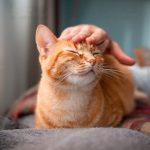Cats are fascinating creatures that have been domesticated for thousands of years. They have unique personalities and behaviors that make them beloved companions for many people around the world. One of the peculiar behaviors that cats exhibit is rolling in dirt.
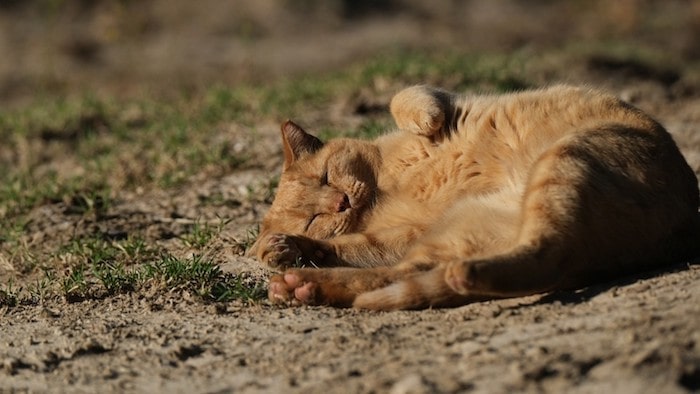
If you have ever owned a cat, you may have noticed your feline friend rolling in the dirt and wondered why they do this. In this article, we will explore the reasons behind a cat’s fondness for dirt, the benefits of rolling in dirt, and how to prevent inappropriate rolling behavior.
Understanding this behavior can help you provide the best care for your furry friend and deepen your bond with them. So, let’s dive in and unravel the mystery of why cats roll in dirt.
Reasons Why Cat Rolls in Dirt
Cats roll in dirt for various reasons, some of which are as follows:
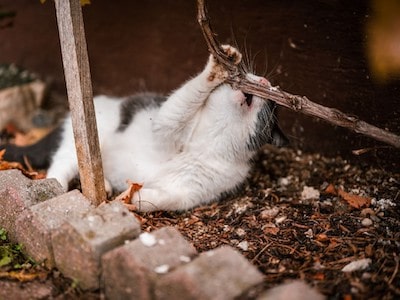
- Scent Marking: Cats have scent glands all over their body, including their paws, cheeks, and chin. Rolling in dirt allows them to pick up scents and transfer them onto their body, making them more identifiable to other cats. This behavior is a way of marking their territory and communicating with other cats.
- Grooming: Cats are known for their meticulous grooming habits, and rolling in dirt can be a part of that. Dirt and dust can help remove excess oil and debris from their fur, providing a natural cleaning process.
- Sunbathing: Cats love to bask in the sun, and rolling in the dirt can be a way to cool down on a hot day. The dirt helps absorb heat, which can be comforting to cats that need to cool off.
- Exfoliation: Rolling in dirt can help exfoliate a cat’s skin, removing dead skin cells and promoting healthy skin.
- Flea Control: Dirt can contain tiny organisms that eat fleas and their larvae. Rolling in dirt can help spread these organisms onto a cat’s fur, providing a natural flea control solution.
- Stress Relief: Rolling in dirt can be a form of stress relief for cats. It provides a way for them to release pent-up energy and feel more relaxed.
- Entertainment: Cats are curious and love to explore their surroundings. Rolling in dirt can be a fun and entertaining activity that keeps them occupied.
- Instinctual Behavior: Rolling in dirt is a natural behavior that has been passed down through generations of cats. It is a part of their hunting and stalking instincts, as rolling in dirt can help mask their scent and make them more invisible to prey.
Benefits of Rolling in Dirt
Rolling in dirt is a common behavior exhibited by many cats, and it can have several benefits for their overall health and well-being. Here are some of the benefits of rolling in dirt for cats:
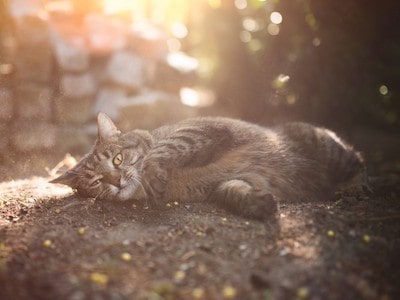
- Flea Prevention: Tiny organisms like nematodes that feed on flea larvae can be found in dirt. When cats roll in dirt, they can transfer these organisms to their fur, which acts as a natural flea control method. Moreover, the dust and dirt collected by cats on their fur helps to absorb excess oil and debris that may repel fleas too.
- Coat Care: Keeping a cat’s coat clean and healthy can be achieved by rolling in dirt. The fur is naturally cleaned as the dust and dirt particles remove excess oil and debris from it. Additionally, mats and tangles are prevented from forming due to the grit present in the soil that helps remove any loose or matted fur.
- Scent Marking: Rolling in dirt enables cats to transfer scents onto their fur because they have scent glands all over their body. This is a behavior used for marking territory and communicating with other cats, which also boosts the cat’s confidence and security in its environment.
- Mental Stimulation: Cats find rolling in dirt fun and entertaining as it gives them mental stimulation and a sense of satisfaction. It is also a way to relieve stress and anxiety, which makes them more relaxed and content.
- Natural Behavior: Cats have an innate tendency to roll in dirt, which is a natural behavior. In their natural habitat, cats use this behavior to conceal their scent and become less visible to prey. Therefore, by permitting cats to perform this activity, we are providing them with an avenue for expressing their inherent instincts and promoting a sense of contentment.
Preventing Inappropriate Rolling Behavior
While rolling in dirt can be a natural and healthy behavior for cats, there are times when it can become inappropriate or even harmful. Here are some tips for preventing inappropriate rolling behavior in cats:
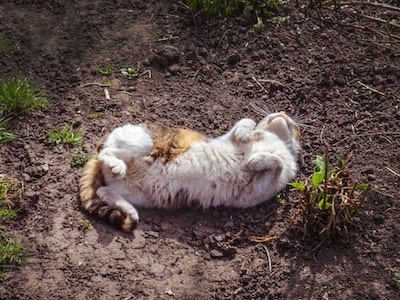
- Provide Adequate Grooming: Regular grooming can help prevent cats from rolling in dirt excessively. Brushing your cat’s coat can help remove any loose or matted fur, preventing mats and tangles from forming. This can also help reduce the amount of dirt and debris that your cat picks up on their fur.[1]
- Provide a Clean Environment: Make sure your cat’s litter box is clean and their environment is free from clutter and debris. A clean and comfortable environment can reduce the urge for cats to roll in dirt or other unsanitary areas.
- Provide Mental Stimulation: Cats that are bored or under-stimulated may be more likely to engage in inappropriate rolling behavior. Providing mental stimulation through toys, puzzles, and interactive play can help prevent this behavior.
- Provide Safe Outdoor Access: If your cat is an outdoor cat, make sure they have access to safe and clean areas to explore. This can help reduce the likelihood of them rolling in unsanitary areas such as garbage cans or compost piles.
- Monitor Their Behavior: Pay attention to your cat’s behavior and intervene if you notice them rolling in inappropriate areas. Redirect their attention to a more appropriate behavior, such as playing with a toy or engaging in interactive play.
- Consult a Veterinarian: If your cat is engaging in excessive or inappropriate rolling behavior, it may be a sign of an underlying health issue. Consult with your veterinarian to rule out any medical conditions that may be causing this behavior.
FAQs
Can rolling in dirt be harmful to my cat’s health?
Rolling in excessively unsanitary areas can be harmful to your cat’s health. It can lead to skin irritation, infections, and exposure to harmful toxins. It’s important to monitor your cat’s behavior and provide a safe and clean environment to prevent any health issues.
Is rolling in dirt the same as a cat taking a dust bath?
No, rolling in dirt is not the same as a cat taking a dust bath. While both behaviors involve rolling in dry materials, dust baths are more common in birds and small mammals such as chinchillas. Dust baths are used for cleaning and maintaining a healthy coat, while rolling in dirt is more of a territorial and scent-marking behavior for cats.
Can indoor cats benefit from rolling in dirt?
While indoor cats may not have access to natural dirt areas, they can still benefit from rolling in clean sand or dirt provided in a controlled environment. This can help with coat care, scent marking, and mental stimulation. However, it’s important to supervise and monitor their behavior to prevent exposure to harmful toxins or unsanitary conditions.
Is rolling in dirt a sign of a medical condition?
Rolling in dirt is not usually a sign of a medical condition, but excessive or compulsive rolling behavior could be a sign of an underlying issue such as allergies, anxiety, or obsessive-compulsive disorder. If your cat is rolling excessively or inappropriately, it’s a good idea to consult with your veterinarian to rule out any underlying medical conditions.
Well, That’s a Wrap
In conclusion, rolling in dirt is a natural behavior for cats with several benefits. From scent marking to flea prevention, rolling in dirt can provide mental and physical stimulation for our feline companions.
However, it’s important to monitor their behavior and provide a safe and clean environment to prevent any health issues. By understanding the reasons behind this behavior and taking the necessary precautions, we can ensure that our cats are happy, healthy, and able to indulge in their natural instincts.

Charlene Pare is the founder of Cat Likes Best. She manages and strategizes the content published on this website. When she isn’t working, she enjoys exploring the city around with her Ameican Shorthair kitty–Moli. Being a technocrat and an avid cat lover, she also writes on pet tech products and some of the featured articles.




